I’ve got clean windows, a full tank of gas and a mug of fresh, dark coffee and I am one happy woman. It might seem that by the 88th day of a road trip, a little road weariness might set in, but it is, in fact, the opposite. The miles that remain are as enticing as the last in a box of fine, dark chocolates – their centers a mystery until the moment of tasting.
This stretch of the Mississippi Great River Road between Baton Rouge, Louisiana, and New Orleans is a mix of gracious antebellum plantations sheltered by moss-draped live oaks and massive conglomerations of petrochemical tanks and pipes secured behind tall chain link fences. Pleasure boats and fishing boats have all but disappeared from the River, replaced by stocky, no-nonsense tugboats and immense, ocean-going cargo ships that seem as out of proportion in this environment as Alice in Wonderland. They have come from all over the world to the Port of Baton Rouge and while some of the flags and names are recognizable, others are mysteriously foreign to me.
After three sips of coffee and ten minutes of relaxing into the road, my attention is grabbed by a small, hand-lettered sign on a nondescript gray building that says, “Welcome Seafarers.” I can’t say why that is of interest and for a few seconds I try to resist what feels like an interruption, but it is a familiar nudge from Serendipity, so I turn around and go back.
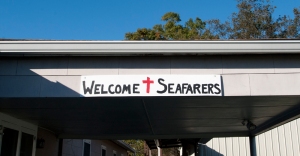
When I enter beneath another sign that says, “Port Ministry Center,” I am accosted by a squirrel-sized dog who seems to think she’d like to eat my leg. Her ruckus brings her humans, who offer a friendlier greeting and introduce themselves as Steve Corbin, the Port Chaplain and his wife, Ann.
The Corbins are accustomed to drop-ins and the dog has decided I am alright, so we tour the building as they explain their work with the sailors who come on the big ships. The seafarers can catch a ride to the store, use the computers or receive whatever practical or spiritual support they might need. It’s rewarding, they tell me, because the men are often surprised and touched to receive such kindnesses so far from home. We chat a few minutes and it seems time to move on. Meeting them has been interesting and has shown me how the international presence of the sailors has flavored this small community. As I begin to say goodbye, Steve says, “Actually, I was just about to go onboard a ship that is in harbor today from Myanmar. Would you like to come with me?” Aha! Now I see!
I had, of course, been curious, but I had not even considered trying to get aboard a ship. I knew that the security would be tight and wending my way through it, if possible at all, would be time-consuming. In the company of Steve, however, who not only has the security clearance but is also well-known at the harbor, it’s a matter of an I.D. and a signature while having a friendly chat with the officer.
Seen from a distance, most of the ships had seemed gritty, some even rusty, but when we step aboard The Sophia, all is shiny white and blue. A smiling sailor in white greets us and leads us downstairs to a room where a handful of men have gathered.
Steve’s purpose today is to deliver gifts of warm hats, knitted by volunteers, and as that word spreads, the room begins to fill. The men are quiet and polite – they laugh softly as they try on hats and gesture their thanks.
We have very little language in common, but they are warm, curious and pleased, I think, to have the diversion of visitors. When our escort translates the story of the raindrop journey to the men, they laugh and nod vigorously and clap their hands together in delight. When I pass out postcards, the atmosphere is as jovial as Christmas. They gather themselves for a group photo before I think to ask and those with cameras in their quarters are sent scurrying to get them.
Steve explains that our visit must be brief, but that we have a few minutes if they would like to show me around. “Yes! Yes, please!” is the enthusiastic response, and we set off immediately. In the engine room, the massive equipment is quiet now and the engineer stands straight and proud in his immaculate realm of mechanical power. He stands at attention, as if he has been expecting us and all is prepared for our visit, as our guide explains what we are seeing.
Then, we climb several flights of stairs to the bridge, the command center of the ship. Our guide respectfully asks permission and then we all step into a broad, bright, semi-circular room edged with inward-slanting windows.
A few people are at work stations in front of monitor screens, controls, gauges, levers, switches and microphones. One of them is the navigator, who lights up with excitement when he learns that I am following the Mississippi River. He wants to show me his maps and when he sees that I am genuinely interested, he becomes a mixture of childlike delight and proud formality. He points to his home, Myanmar (formerly Burma), and traces with his finger the route they have traveled. He lays each map out carefully, smoothing it gently, and shows me on a series of maps in progressively finer detail where they entered the Mississippi River from the Gulf of Mexico and the miles they have traveled since then. Language is cumbersome, but communication is fluent. I understand how devoted he is to his important job and how competently he handles it.
Next, I am invited to meet the Captain, who welcomes me into his office with the same courtly elegance that I have seen in everyone. His English is very good and there is an easy rapport between us within minutes. As we talk, his expressive face reflects every feeling and his openness touches me. He speaks about his job – what he loves about it and how he sometimes feels the weight of its responsibility. Then, with a tone and a look that tugs at my heart, he talks about the long months away from home. “It was easier,” he says, “before there was a child. Now, it is harder.” I feel his integrity and I see his dedication to both his crew and his family – and, now that I have met him, I see those qualities reflected in everything that I have seen and heard on board.
Steve and I have lunch in a small café and he talks about his calling to this ministry and about the loneliness he sees in the sailors he serves. He knows he is making a difference.
Back at my car, I dump the cold coffee on the grass. As I resume where I left off 3 ½ hours earlier, I whisper a thank you for being shown once again that this world is filled with goodness.

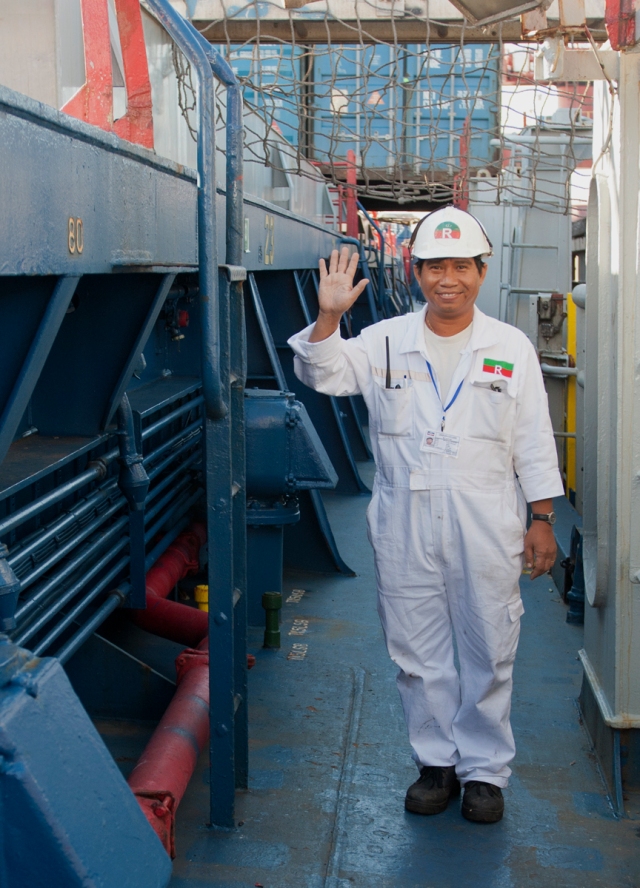

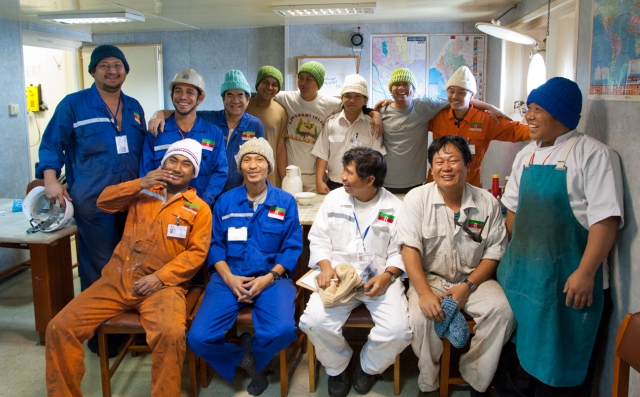
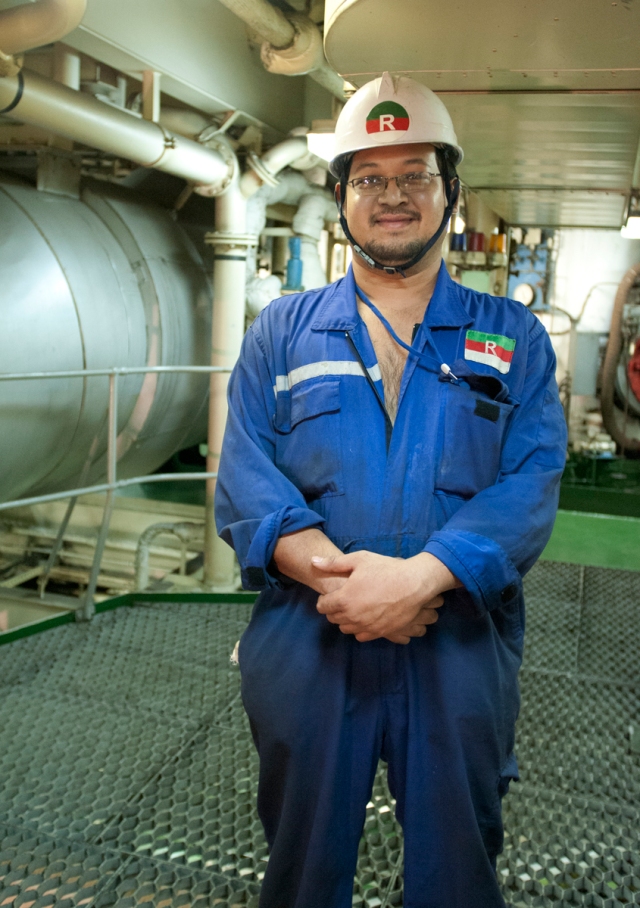


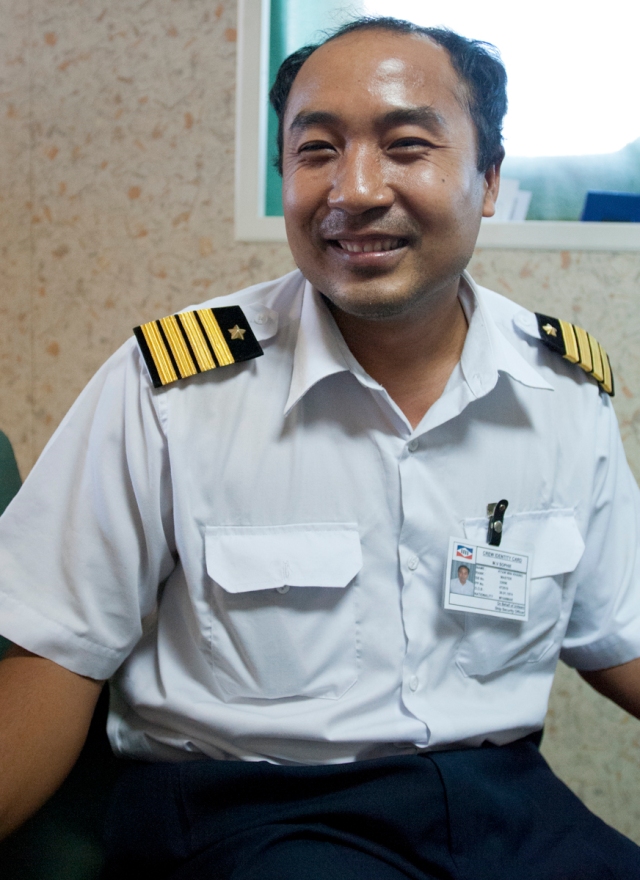
 Sandy Reese - Southwest Missouri Camera Club - Springfield, Missouri says
Sandy Reese - Southwest Missouri Camera Club - Springfield, Missouri says
July 30, 2013 at 9:49 pmKindness and a smile are a universal language. Enjoying this so much!
Sandy Reese, Springfield, Mo.
 Marilyn says
Marilyn says
August 8, 2013 at 2:52 amWhat a wonderful world we live in! Your stories and pictures make it even more wonderful!
 Gayle Harper says
Gayle Harper says
August 8, 2013 at 2:54 amThanks Marilyn! I agree about this world!
 R Todd Morriss says
R Todd Morriss says
October 20, 2013 at 12:16 pmIt is wonderful how you transform the hard cold steel of these container ships into the welcoming warmth of friendly people. I have enjoyed all of your little snippets. These last two weeks are going to be nail biting. PEACE, Todd
 Gayle Harper says
Gayle Harper says
October 21, 2013 at 7:56 pmThank you, Todd. I truly appreciate all your help and support! I think we can do this! 🙂